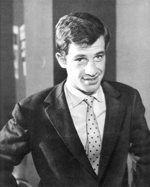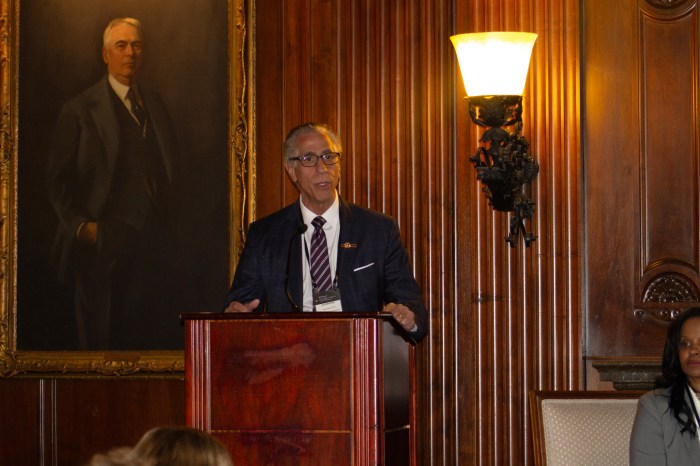The Debbie & Ben Show; Milla’s melodies; good noir and good luck
Musically, it doesn’t get more celestial than the “Debbie & Ben Show,” which is how opera aficionados affectionately referred to the Lincoln Center Fall Gala concert given by tenor Ben Heppner and soprano Deborah Voigt at Avery Fisher Hall on November 9. La Voigt made a sensational entrance that had fans screaming, looking ultra-svelte in a ball gown—a fabulous rebuke to those idiots at Covent Garden who fired her last year because she was thought too fat to wear the little black cocktail dress that “naturally” figures in every respectful production of Strauss’ “Ariadne auf Naxos.”
Voigt’s weight loss seemed to have affected her voice not a whit; indeed, it was more lustrous than ever, while Heppner has happily put some pounds back on. He sounds much better than when his slimmer self did “Tristan und Isolde” at the Met. When these two singers conjoined on the “Tristan” love duet, the entire audience was wafted to heaven. For the second act, Voigt delivered a blazing, thrilling “Dich, teure Hall,” which has become her signature, which Heppner followed with his fully-owned “Die Meistersinger Prize Song,’ the equivalent of two operatic grand slams in a row.
Voigt will be profiled on “60 Minutes,” in which she is adorably filmed at Village gay bar The Monster, belting out show tunes with all those pitch-challenged Merman wannabes. Tuning in, I’m sure, will be writer Bruce-Michael Gelbert, who sat in front of me in hysterical, full Eagle’s Nest regalia, including chapeau and Mr. Fire Island Leather 2001 jacket.
That jacket was also in plain evidence at “Zazà,” at Alice Tully Hall on November 12, presented by the estimable Teatro Grattaciello, devoted to reviving forgotten Italian verismo operas. This Ruggiero Leoncavallo rarity was Geraldine Farrar’s swan song at the Met in 1922, where she scandalized audiences by hoisting her skirts and spraying perfume on her underwear. Before that, “Zazà” was performed, in its David Belasco-penned, music-less original incarnation by such as Réjane—in Poiret gowns—and the American Sarah Bernhardt, Mrs. Leslie Carter, whom director George Cukor always quoted when she dissed somebody’s performance by saying it was “the firm, firm hand on the wrong, wrong note.”
Cukor also directed Claudette Colbert in the opulently stylish 1939 Paramount film “Zaza,” wherein she gives her sexiest, most touching performance. Other film versions of this once durable, now forgotten vehicle were made by Pauline Frederick, Lilo, and even Gloria Swanson, in a 1922 silent.
It’s clearly a work that demands a real star in the title role and, at Alice Tully, we were certainly given one in the person of soprano Aprile Millo. Playing this musical hall star who almost gives everything up for the love of a married man, she wore a flowing black cape and, amusingly, dark rimmed reading glasses, which made her appear something of a gravity-challenged Batwoman. To paraphrase Henry James, Millo has obviously been taught by masters because she employed a battery of haute diva effects and a very healthy-sounding voice—despite the pre-performance announcement of her suffering from a cold—to will this concert opera into life. She really tore it up at the end, making a lengthy shoulder-shuddering, sobbing farewell to her man, which nearly made you believe the program’s modest claim that she is “the world’s leading verismo interpreter.”
More lovely vocals were heard from Milla Ilieva at The Encore on November 4. Her show, entitled, “So Many Nights, So Many Men,” may have been nothing new in terms of theme—amazing how cabaret-enduring is that single woman complaining about relationships but finding solace in food—but her singing was the real, wonderfully trained deal, helped by Paul Trueblood’s elegant piano and Margery Beddow’s savvy direction. Ilieva was especially lovely on Gershwin’s “Do It Again” and Rodgers & Hart’s “Where’s That Rainbow?” to which she gave a poignant delicacy akin to Helen Morgan. I suggested that she do more of this, even an entire show devoted to the torchiest songstress. Ilieva has the right, dark, voluptuous look and seemed to lap up the idea like Devon cream.

That night, actress Dody Goodman of “Mary Hartman, Mary Hartman” fame, celebrated her 90th birthday and, although the waiters didn’t sing to her at Joe Allen, we all did so at The Encore. The place has an added kick when you think of its earlier incarnation, as the gay hustler bar Stella’s. They really haven’t changed it all that much, and you can almost still feel the steamy presence of all those generously pronged go-go boys on the stage where, now, weighty dames and wispy lads warble of lost loves.
Goodman, who played in “Hello Dolly,” told me a great Carol Channing story. She was once backstage when she saw Channing open one of those little rubber coin purses and remove an already-chewed piece of gum and pop it in her mouth. By way of explanation to Goodman, the then health food-minded, sugar-eschewing Channing said, “Charles [her ex-husband, whom she claimed never to have slept with when they waged their stormy divorce] chews all the poison out for me!” Goodman, with her adorable mien and slightly addled intensity, has always reminded me of a comically skewed version of America’s most underappreciated great actress, the ineffable Miriam Hopkins. “Oh I used to get that all the time!” she said.
I love film noir, but must admit that there are so few really good ones. For every “Double Indemnity, “The Big Sleep (1946),” “Out of the Past,” “The Long Goodbye” or “Chinatown,” there are at least ten clinkers like “Dark Passage,” “The Lady in the Lake,” “Hammett,” or the 1976 remake of “The Big Sleep.” Film Forum, through December 1, is showing an absolute honey of one, though, Claude Sautet’s “Classe Tous Risques,” that rare noir, which also moves you emotionally. Professional wrestler-turned-actor Lino Ventura plays a career criminal on the run, saddled with his two little boys, and the dilemma of the kids adds a real desperation and hopelessness to his flight. Sautet’s gifts of human observation are evident in the memorable gallery of characters Ventura encounters, from Marcel Dalio’s shifty antiques dealer to his surly niece who receives one of the most satisfying comeuppances in film history. An irresistible young Jean Paul Belmondo, Michel Ardan, and Aimé de March round out a cast notable to my gay eye for all the Gallic hunkiness going on. Vive les mecs Francaises!
Contact David Noh at Inthenoh@aol.com.
gaycitynews.com



































